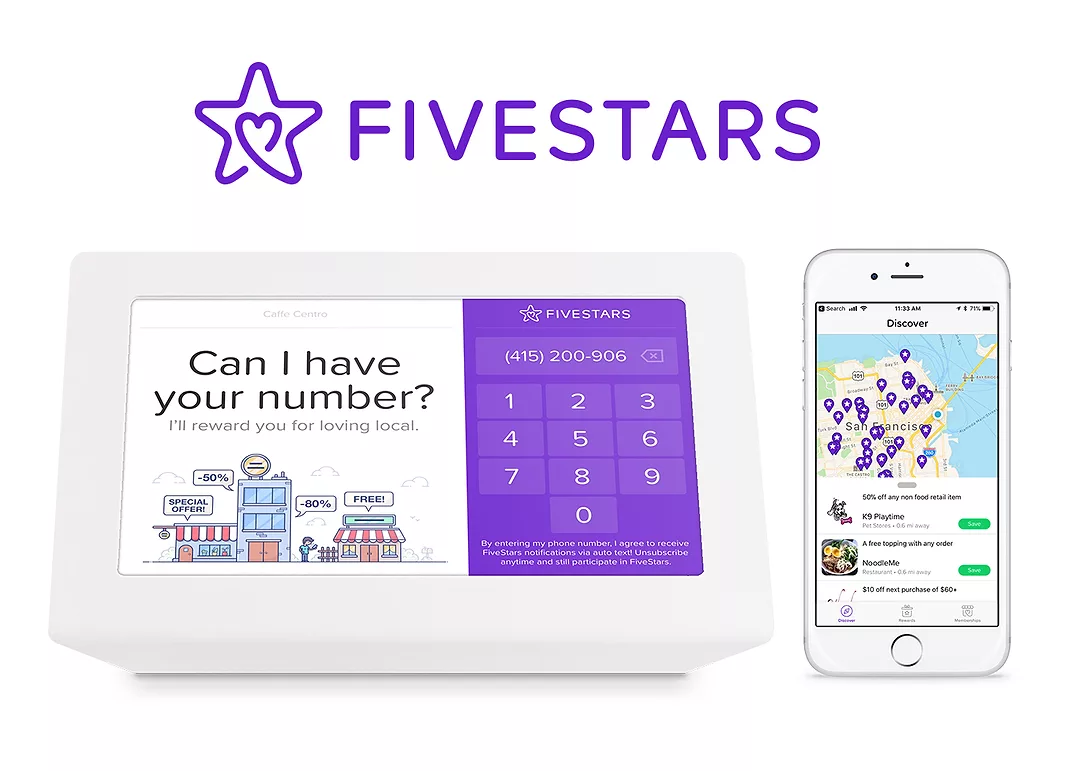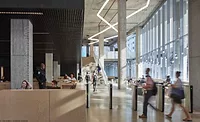Building Loyalty with Touchless Access Control


From spas to coffee shops to apparel stores, Fivestars wants customers to buy local. And the company does its part by offering a range of loyalty and payment services that help about 15,000 mostly mom-and-pop sized businesses across the United States establish bonds with 55 million patrons. Delighting customers is in Fivestars’ DNA. And it doesn’t wish to treat its staff any differently.
Fivestars has offices across the country, including a call center in El Paso, Texas, and small operations for sales and software engineering in cities such as Austin, Texas, and Denver, Colo. Company headquarters are in downtown San Francisco in a subleased 17,000-square-foot space that typically holds from 100 to 120 of the company’s overall 350 staff members.
When Fivestars moved into its digs in the China Basin district two years ago, it inherited left-behind pieces of an access control system. Security cameras and proximity card readers were in place, but the former tenant had taken the central server with them, leaving “dumb” components in their wake. Fivestars had to hire a company to identify what kind of system it was and who could make it operational. That company recommended that Fivestars hire S2 Security to wrangle the existing access control and video hardware into an integrated system on a single server, adding intercoms from Aiphone into the mix. Only a few doors had controlled access: the main entrance and back entrance to the office as well as the server room; the front and rear doors lead to a publicly accessible area where the elevators and restrooms are located.
The system was reliable and effective, but staff often left keycards at home or on their desk. Trying to get back to their workstation after lunch or after using the restroom, for example, returning staff would ring the doorbell to get back in. Letting staff back in turned into an annoyance and poor use of time. Fivestars began using the intercom system to remotely unlock the doors, but that became disruptive as well. The problem persisted because company policy was to charge staff to replace lost cards. Instead of acknowledging that they lost their card and paying up, arriving staff would either ring in, wait for another staff member to let them in, or tailgate. As a result, the access control system couldn’t accurately provide an audit trail for the comings and goings of staff. The video surveillance system had to be enlisted for that purpose, which further wasted time and resources.
Almost 30 sales staff, who only visited periodically, exacerbated the issue. They would frequently lose their newly issued keycards or forget to return them. Fivestars even placed badges in unusually heavy holders and tried other methods to remind sales staff that they had borrowed cards — but that didn’t work. The cards would have to be deactivated and new cards printed for the next visit.
Through a casual conversation, Fivestars learned about Swiftlane, a San Francisco-based startup that provides touchless access control using face recognition, offering alternative identification or two-factor authentication via mobile phone. Intrigued by the premise that they wouldn’t have to issue or replace keycards or buzz in forgetful staff, Fivestars decided to give the Swiftlane system a try. After all, staff rarely went anywhere without their mobile phone, and even the most forgetful person couldn’t leave behind their face.
Installation was quick and took only a few hours. The Swiftlane camera/reader system is independent of the keycard system: it doesn’t share any hardware or software.
Enrollment was easy. The list of keycard users was exported to the new system, then pruned of former employees, unknown accounts, and unassigned cards. Staff names were matched with email addresses, and personnel were instructed how to download software onto their phones that enabled them to enroll themselves in the system. Since the company is in growth mode and brings in new hiring classes twice a month, new employees have subsequently enrolled in the system as well.
The system was installed and tested by a few staff in December 2019 and went live the following month. Staff had the option to either use the keycard system — which remained active — or transition to facial recognition. With this new system, face recognition is optional so users can choose to utilize face recognition or mobile unlock. A few hiccups occurred as Fivestars learned how to customize the system, but the biggest headache had nothing to do with the technology: A few users, having seen only surveillance style face recognition in the past, were concerned about privacy invasion. However, Swiftlane does not run surveillance but only uses biometrics for face recognition based access control. These users were allowed to use their phones instead to gain access. (Cell phones can be added to face recognition as a second factor of authentication if Fivestars wishes to tighten security.) Other users who were initially reluctant have become comfortable with facial recognition after learning the controlled and limited manner in which Fivestars was using their image. Ultimately 70 percent of employees opted to use face recognition instead of mobile unlock because it was touchless and seamless.
During January, staff gradually abandoned the keycard system in favor of the new system, though the card readers were retained as a backup. Fivestars began disabling keycards for everyone except staff needing access to the server room, which still can only be entered using the keycard or a keypad. Eventually, the keycard system will be retired from that door as well, and face recognition might be added to supplement the keypad entry.
The system has been a big hit. Staff no longer have to fumble for cards while they are holding items, nor do they have to endure a wait of shame while someone buzzes them in. The ultimate seal of approval came from the VP of sales who was visiting from Chicago. He enrolled in the new system before arrival, and when he was leaving the office for lunch with the CEO, remarked that it was “the best system ever.”
With San Francisco in lockdown beginning in March, very few staff came to the office in April (and likely indefinitely), and only irregularly. Shutdown of the old system is on hold because of the Coronavirus pandemic. It remains to be seen how the new system identifies people wearing surgical masks. In the one occasion the system was tested, it didn’t recognize the enrolled user wearing a mask and hat. That person had to remove those items before the system granted access.
Fivestars’ move to touchless access control proved to be prescient. In coming months, staff will be returning to workplaces around the world reluctant to touch anything they don’t have to. And accommodating staff concerns about safety and hygiene wins their loyalty. And who would know that better than a loyalty company?
Looking for a reprint of this article?
From high-res PDFs to custom plaques, order your copy today!







